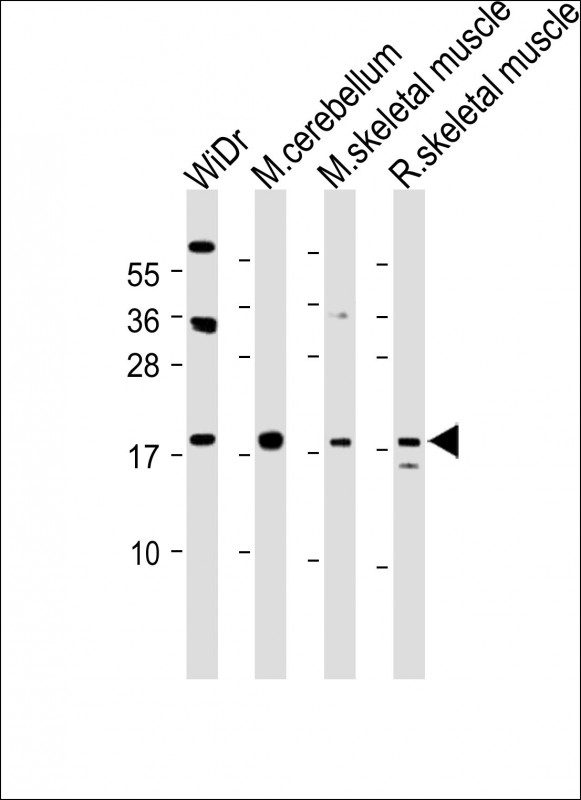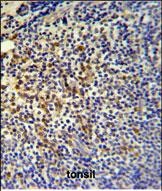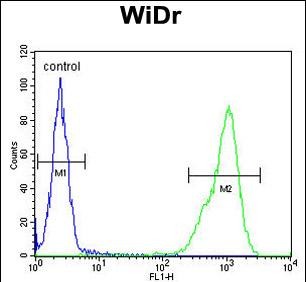TPPP3 Antibody (C-term)
Affinity Purified Rabbit Polyclonal Antibody (Pab)
- SPECIFICATION
- CITATIONS: 3
- PROTOCOLS
- BACKGROUND

Application
| FC, IHC-P, WB, E |
|---|---|
| Primary Accession | Q9BW30 |
| Other Accession | Q5PPN5, Q9CRB6, Q3ZCC8 |
| Reactivity | Human, Mouse, Rat |
| Predicted | Bovine |
| Host | Rabbit |
| Clonality | Polyclonal |
| Isotype | Rabbit IgG |
| Calculated MW | 18985 Da |
| Antigen Region | 117-146 aa |
| Gene ID | 51673 |
|---|---|
| Other Names | Tubulin polymerization-promoting protein family member 3, TPPP/p20, TPPP3 |
| Target/Specificity | This TPPP3 antibody is generated from rabbits immunized with a KLH conjugated synthetic peptide between 117-146 amino acids of human TPPP3. |
| Dilution | FC~~1:10~50 IHC-P~~1:50~100 WB~~1:2000 E~~Use at an assay dependent concentration. |
| Format | Purified polyclonal antibody supplied in PBS with 0.09% (W/V) sodium azide. This antibody is purified through a protein A column, followed by peptide affinity purification. |
| Storage | Maintain refrigerated at 2-8°C for up to 2 weeks. For long term storage store at -20°C in small aliquots to prevent freeze-thaw cycles. |
| Precautions | TPPP3 Antibody (C-term) is for research use only and not for use in diagnostic or therapeutic procedures. |
| Name | TPPP3 {ECO:0000303|PubMed:19633818, ECO:0000312|HGNC:HGNC:24162} |
|---|---|
| Function | Regulator of microtubule dynamic that has microtubule bundling activity (PubMed:17105200, PubMed:19633818). Required for embryo implantation; possibly by regulating beta-catenin (By similarity). Also required for decidualization via regulation of beta- catenin (PubMed:30667362). |
| Cellular Location | Cytoplasm. Cytoplasm, cytoskeleton |
| Tissue Location | Expressed in endometrium during the mid-secretory phase (LH + 7) (at protein level). |

Provided below are standard protocols that you may find useful for product applications.
Background
TPPP3 binds tubulin and has microtubule bundling activity. TPPP3 may play a role in cell proliferation and mitosis.
References
Zhou, W., et al. Mol. Cell. Biochem. 333 (1-2), 91-98 (2010) Martins-de-Souza, D., et al. Eur Arch Psychiatry Clin Neurosci 259(3):151-163(2009) Vincze, O., et al. Biochemistry 45(46):13818-13826(2006)
If you have used an Abcepta product and would like to share how it has performed, please click on the "Submit Review" button and provide the requested information. Our staff will examine and post your review and contact you if needed.
If you have any additional inquiries please email technical services at tech@abcepta.com.














 Foundational characteristics of cancer include proliferation, angiogenesis, migration, evasion of apoptosis, and cellular immortality. Find key markers for these cellular processes and antibodies to detect them.
Foundational characteristics of cancer include proliferation, angiogenesis, migration, evasion of apoptosis, and cellular immortality. Find key markers for these cellular processes and antibodies to detect them. The SUMOplot™ Analysis Program predicts and scores sumoylation sites in your protein. SUMOylation is a post-translational modification involved in various cellular processes, such as nuclear-cytosolic transport, transcriptional regulation, apoptosis, protein stability, response to stress, and progression through the cell cycle.
The SUMOplot™ Analysis Program predicts and scores sumoylation sites in your protein. SUMOylation is a post-translational modification involved in various cellular processes, such as nuclear-cytosolic transport, transcriptional regulation, apoptosis, protein stability, response to stress, and progression through the cell cycle. The Autophagy Receptor Motif Plotter predicts and scores autophagy receptor binding sites in your protein. Identifying proteins connected to this pathway is critical to understanding the role of autophagy in physiological as well as pathological processes such as development, differentiation, neurodegenerative diseases, stress, infection, and cancer.
The Autophagy Receptor Motif Plotter predicts and scores autophagy receptor binding sites in your protein. Identifying proteins connected to this pathway is critical to understanding the role of autophagy in physiological as well as pathological processes such as development, differentiation, neurodegenerative diseases, stress, infection, and cancer.



